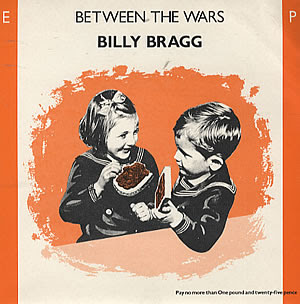
And so, skipping over Scary Monsters, we find ourselves in the company of over-produced 80's Bowie. Let's Dance (1984) is a strange record in that despite sounding like Nile Rodgers had seen a Bowie/Chic fusion as a good idea, the songs aren't terrible. I think the general view is that the album as a whole is a dud, but I can't help but have a soft spot for it. It's certainly not the glorious triumph that preceding albums had been, but as long as you approach it as a straight pop album it's great. Again, the version of 'China Girl' on The Idiot is much better than the version on Let's Dance, but it's fine and the title song and 'Modern Love' I really like as relatively simple pop songs. It's all a bit naff and it's all a bit sterile, but I really don't mind Let's Dance. I haven't got anything Bowie released after though, even I won't go that far. Finally for Bovril it's the 1990 issue of the Changesbowie compilation. Hardly anything on Changesbowie is taken from the albums that I've not got and so it's a useful round up the bits and pieces from the albums that the law says I'm supposed to love and don't. Don't go near the 1990 remix of 'Fame' though, it's ghastly...
Next is the only album that was released by indiepop outfit Boycrazy. Foreign Words (2000) is pure charm from start to finish, one of those rare twee-pop albums that doesn't cloy and isn't infuriating. If anything it's just a delightfully summery low-key bit of breezy indiepop that late spring days were made for. I get the feeling that they were one of the many Portland bands who could have gone on to do more if there hadn't been a glut of similar bands in that area at the time. It's a shame though because despite the cheery and light sound, there is some interestingly murky stuff going on in the background to this album which sets it a bit apart, and the ramshackle sound of it all isn't by accident, I suspect it's by clear and tight design.
And so on to good old Billy Bragg, starting with debut mini-LP, Life's a Riot with Spy vs Spy (1983). Seven lovely little scrappy riffs on politics and ordinary human life, the quality of songwriting is variable to say the least, but between Bragg's delivery and his reverb drenched, tinny guitar, I can't help but be charmed every time I hear it. The songs that are decent are really great, and throughout his career Bragg's best songs tend to be the delicate ones about relationships rather than the political rabble-rousers and so 'Richard' and 'A New England' win out here. First album proper, Brewing Up with Billy Bragg (1984) is a step forward in terms of production (it sounds like someone was behind the mixing desk - that's the only difference really), but identical in delivery. The songs are much stronger on the whole though, and some, like 'St Swithin's Day', are genuinely lovely even despite Bragg's gruff "working-man" vocal. The 'Between the Wars' 7" is OK, the title track is decent typical Bragg leftist stuff.

1986's Talking with the Taxman about Poetry was another step forward, with some fabulously gentle songs about British domestic life. He still couldn't get round the tendency to browbeat musically speaking with the political songs and although the plain speaking lyrics of 'Ideologies' I have no problem with, it's as if he can't bring himself to bring any sophistication to the tunes. 'Levi Stubb's Tears' on the other hand is a really nicely structured song with some delicate phrases, and proves again that even if the underlying point is political, it's the domestic songs that he really excelled at. I suppose it was just the political atmosphere at the time that meant that plain speaking from the left was important (more so now than ever I would have said, but it appears everybody is too scared to express ideological stances from the left. Fine for the right apparently but from the left? "God, you're so naive, etc, etc...") and expected, and Bragg's gentler tunes went largely unnoticed until times changed.

Bit more Bragg tomorrow then a whole load of Bread. Jesus, "a whole load of Bread". That sounds terrifying, no?
No comments:
Post a Comment